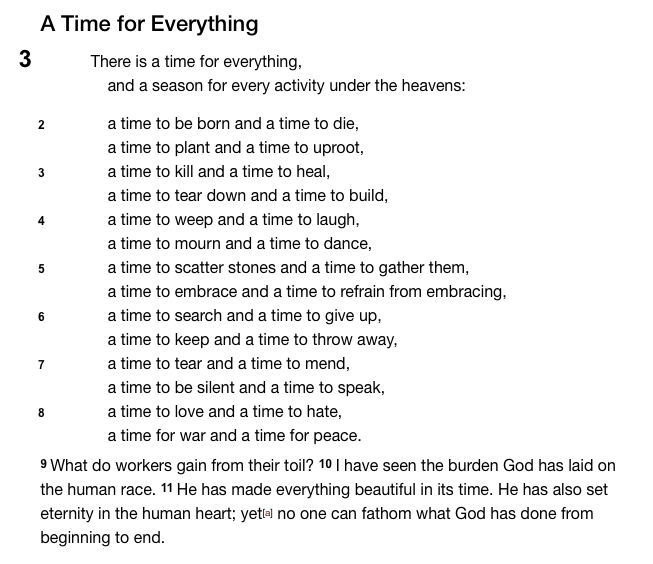All the time in the world?

It was Wednesday night in July. The State of Origin was about to start. In my loungeroom, a couple of mates were gathered around to watch the game. Kick-off was just minutes away. Over the noise of the TV and rugby league cliché’s I heard raised voices coming from the driveway next door. I walked outside to have a quick look. My neighbour - a man I had known and liked for years - was standing at the front of his home looking shattered.
“What’s the matter mate?” I asked. He explained slowly and sadly how he’d just had a major blow-up with his wife. It hadn’t ended well. She had driven off. It was serious. I half-listened as he told me of his life unravelling. Half-listened because kick off was happening and the game was starting. I half-listened, muttered some clichés of my own and went back inside to watch the game.
My neighbours’ marriage never recovered and I have carried the guilt for many years. It’s not that I have a messiah complex and assume I could've fixed it. It’s just that I so totally got the “time” wrong. What do I mean? Of course, I can’t remember the result of that game, I can’t even remember who was there with me to watch it. I don’t know if my neighbour remembers the incident, but I remember and I know I made a massive mistake in not understanding the time. Because I didn’t understand the time, I didn’t do the right thing. I got it completely wrong.
I want to share with you a different way of understanding time, and why it matters.
What if time isn’t a constant stream of undifferentiated minutes rolling across the face of your digital clock? What if we should understand time as a series of seasons, or opportunities, or events that happen in the here and now. Events that mostly we can’t control but that we can respond to in the right way - a time to speak up, a time to listen, a time to laugh and a time to morn. Then wisdom (ie getting life right) would not be about fitting more and more into our days - with calendars, planners and ever faster technology. No, wisdom would be about realising what season or time it is and responding in the right way.
What time or season is it in your life now, and how should you respond? What is happening and what is the wise response? That’s the wisdom given to us in the book of Ecclesiastes in the Old Testament part of the Bible.
Ecclesiastes Chapter 3 says life is a series of seasons or events (actually things that we can’t control) and wisdom (or a life lived well) is learning to respond to these seasons in the right way. When my neighbour spoke to me, it was a time to listen. To realise that the game of football is fun but trivial. To realise in a few weeks, I wouldn’t even remember who won the game, but the opportunity to listen to my friend and neighbour - to care for him - would be remembered for years, maybe a lifetime.
There are key moments in our lives and in the lives others, turning points, that are crucial. Moments when we have the chance to make a difference in someone’s life - the death or sickness of a loved one, a cancer diagnosis, retrenchment, separation. Almost always, these events can’t be scheduled, can’t be controlled. But they can be recognised. When these events occur, wisdom says, forget the schedule and the planning, understand what season it is and respond. Be there, listen, care. You can’t schedule these times, you can only respond.
So much of life we can’t control - although I try very hard. I have an Apple calendar that will let me schedule events and meetings to the nearest 5 minutes up to 100 years in advance! I mean 100 years - I’ve checked. I’ve got 100 years of planning in my pocket everywhere I go. I can instantly know the time in any city around the world, but have I got my eyes open to what season or time it really is in front of me now?
 Ecclesiastes 3 is telling us that wisdom - proper time management - isn’t about doing more and more things, but doing the right things at the right time. This can apply in the moment, a time to listen or a time to speak up. It can apply to big seasons of life too, when you’re middle aged it’s dumb to try to act like you’re 20. There’s a time to be humble enough to search for mentors, and there’s a time to be generous enough to be one.
Ecclesiastes 3 is telling us that wisdom - proper time management - isn’t about doing more and more things, but doing the right things at the right time. This can apply in the moment, a time to listen or a time to speak up. It can apply to big seasons of life too, when you’re middle aged it’s dumb to try to act like you’re 20. There’s a time to be humble enough to search for mentors, and there’s a time to be generous enough to be one.
Understanding the season or the time we are in helps make sense of life. In fact, see verse 11: God has made everything beautiful in its time. The right action at the right time is beautiful. Getting that right may well interrupt our carefully planned schedules, but those key moments can make such a difference to life.
Left on our own, if this world is only what we can see and touch, eventually, inevitably life feels empty. See verses 9 and 10. What do we gain from all our work, planning, projects and schedules? Did you notice that with the swing of the pendulum in the poem, events cancel each other out; laugh and morn, break and build, gather and scatter. In the end nothing changes, nothing happens. That’s the burden God has laid on us. We can see this and feel this but not find the answer. Verse 11 tells us God has put eternity in our hearts so we know there’s more to life than what we can see and touch. But we can’t find the answer on our own.
What if there was a season or time when God himself turned up to explain to us the meaning of life and why eternity is in our hearts? It would be wise to realise it’s time to listen.

Al Stewart is the Chief Operating Officer of City Bible Forum. He has been in Christian ministry for 30 years, including setting up congregations in Mt Druitt, the eastern suburbs of Sydney and the Wollongong region. Al was also involved in commencing the Geneva Push and was the chairman of the Katoomba Christian Convention from 2005-2014. He served as a bishop and the director of Evangelism Ministries with the Sydney Diocese of the Anglican Church. He is married to Kathy and they have 4 grown children.

